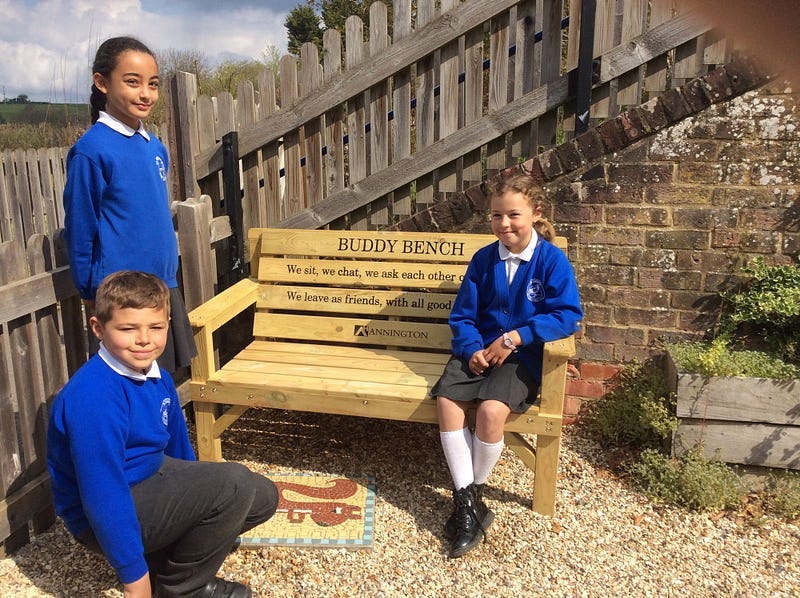The Friendship Bench


As someone who suffers from loneliness, I often think about all the other lonely people that must be out there in their own neighbourhoods. My worry is that we’ve become socially distant from one another due to fear and safety. Loneliness can be a very serious problem, and it can have a hugely negative impact on our mental and physical wellbeing. The Friendship Bench would provide a safe and supportive space for people to connect with others and feel less alone while combatting social isolation.
Do you remember when you were a child, and the milkman knew the names of each household? Same of the postal worker who would say ‘good morning, Mrs or Mr. Jones for example. Those days helped to bring streets and communities together.

Friendship Bench In the Community (short story)
In the heart of bustling London, amidst the towering skyscrapers and the ceaseless hum of traffic, there existed a sanctuary for the lonely souls who sought solace and connection — the Friendship Bench. Nestled within a tranquil courtyard, away from the clamour of the city, the Friendship Bench stood as a beacon of hope, a place where strangers could find friendship and companionship.
Among the throngs of faceless commuters, there was a young woman named Sarah, her heart weighed down by a veil of loneliness. The city, once a vibrant kaleidoscope of life, now seemed distant and alien, mirroring the emptiness she felt within. Sarah longed for a connection, a bond that could pierce through her solitude and bring her back into the warmth of human warmth.
One day, guided by a whisper of serendipity, Sarah found herself drawn to the Friendship Bench. As she sat down, the cool wooden surface felt comforting beneath her fingertips, a gentle reassurance that she was not alone. Minutes ticked by, and Sarah’s heart sank with the realization that no one would approach her. The bench, once a symbol of hope, now seemed to mock her isolation.
Just as despair threatened to overwhelm her, a gentle voice broke through the silence. “Mind if I join you?” Sarah turned to find a kind-faced woman, her eyes radiating warmth and understanding. Without hesitation, Sarah welcomed her to the bench, her heart fluttering with a mix of apprehension and anticipation.
As they delved into conversation, Sarah found herself pouring out her fears and loneliness, her words flowing like a dam breaking. The woman listened intently, her presence a soothing balm to Sarah’s wounded soul. In that moment, Sarah felt a connection with her newfound friend, a sense of understanding that had been missing for far too long.
The Friendship Bench, once a lonely symbol, now had a new meaning for Sarah. It was a place where she could shed her inhibitions, confront her loneliness, and find solace in the company of others. It was a testament to the power of human connection, a reminder that even in the midst of a bustling metropolis, there was always someone waiting to offer a helping hand, a listening ear, and a genuine friendship.
City life can be particularly stressful which is the idea of the ‘Friendship Bench’ could actually work. Physically or virtually, it could help bring people together to talk about mental health which could possibly help to remove the stigma that exists within certain communities.

Friendship Bench in Schools

On the 14th of August 2021 I spoke to a treasured friend of mine (more of my niece really) based in the US. The topic of conversation was around ‘youth mental health’ and the importance of friendships.
She told me an amazing story about her school in Singapore and how they had a ‘Friendship Bench’ in the playground for kids. I found it incredible that at the age of 8-years lonely kids could sit down on this bench, and someone would come over for a sit down and a chat.
Now my friend, now an adult was always an incredible outgoing soul that would befriend a kid and invite them over to meet her other friends. The idea of a “Friendship Bench” is a wonderful one, and I think it would be a great way to help combat loneliness, both in children and adults.

Friendship Bench in The Workplace
In the adult world of business, a Friendship Bench could be located in the break room or other communal area. The ‘befriender’ could be an employee or a volunteer who is trained in active listening and conflict resolution. The Friendship Bench could be a place for people to vent about their work problems, talk about their personal lives, or just relax and chat with someone friendly. I think the Friendship Bench would be a great way to promote mental health and well-being in the workplace. It would also help to create a more positive and supportive work environment.
Encouraging social interactions can provide opportunities for employees to socialize outside of work. But more importantly, promoting open communication can create a culture where employees feel comfortable talking about their personal lives and work-related problems.
Training managers on how to recognize and support employees who may be struggling with loneliness. So, by taking these steps, companies can help to create a more connected and supportive workplace, and they can help to improve the mental and physical health of their employees.
The Friendship Bench — Zimbabwe
From Wikipedia, the free encyclopedia The Friendship Bench programme is a Zimbabwean community-based mental health…
In the heart of busy Zimbabwe, amidst the vibrant streets and lively marketplaces, there existed a haven for the troubled souls who sought solace and healing — the Friendship Bench. Founded by the Centre for Global Mental Health, this remarkable initiative has transformed the lives of countless individuals, providing them with the support and guidance they desperately needed.
The Friendship Bench programme is a Zimbabwean community-based mental health intervention where trained community health workers (known as “grandmothers”) sit on wooden park “Friendship Benches” set up at primary health care clinics or safe community spaces and provide structured problem-solving talking therapy to community members who come looking for mental health support or are referred by nurses or other community members
The Friendship Bench model is unique in its simplicity and effectiveness. Unlike traditional therapy settings, the Friendship Bench is not confined to clinical settings or specialized personnel. Instead, it utilizes the power of community engagement and the wisdom of lay health workers, or trained members of the community, to provide mental health support to those in need.
These lay health workers, undergo rigorous training in Problem-Solving Therapy, a cognitive-behavioural approach that focuses on empowering individuals to identify and address their own mental health challenges. They are then deployed to various communities, where they set up Friendship Benches — ordinary benches painted in cheerful colours — in public spaces like marketplaces, clinics, and schools.
When someone seeking help sits on a Friendship Bench, the Facilitator approaches them, offering a listening ear and a non-judgmental space to express their concerns. The Facilitator then guides the individual through Problem-Solving Therapy techniques, helping them identify their problems, develop realistic solutions, and implement strategies to improve their mental well-being.
The Friendship Bench’s impact has been nothing short of remarkable. Studies have shown that the model is highly effective in reducing symptoms of depression and anxiety, improving coping skills, and enhancing overall mental health. The program has also proven to be cost-effective and scalable, making it a sustainable solution for addressing mental health challenges in resource-limited settings.
The Friendship Bench | Centre for Global Mental Health
Uses a brief psychological approach based on problem-solving therapy carried out by lay health workers
www.centreforglobalmentalhealth.org
For many individuals, the Friendship Bench has been a lifeline, providing them with the support and guidance they needed to navigate life’s challenges and reclaim their sense of well-being. The program has not only alleviated suffering but also empowered individuals to become agents of change within their communities, transforming the stigma associated with mental health and promoting mental well-being for all.
The Friendship Bench — International
As the Friendship Bench continues to expand its reach, it serves as a beacon of hope, demonstrating the transformative power of human connection and the effectiveness of community-based mental health interventions. It is a testament to the belief that even in the face of adversity, there is always a place for healing, a place where hope can bloom, and a place where friendship can mend broken spirits.
Here’s a practical example of how Athens County brought the Friendship Bench from Zimbabwe to OHIO to address a growing public health concern.
How Athens County is using ‘friendship benches’ to address a growing public health concern
The county adopted the idea of friendship benches from Zimbabwe. It aims to address social isolation by bringing…
Hopefully like me you’re totally inspired, so the challenge is ‘how do we get a Friendship Bench; within walking distance, everywhere?’
‘Our vision is a Friendship Bench within walking distance-everywhere’
In this interview, Zimbabwe-based psychiatrist Dixon Chibanda discusses mental health and the evolution of his…
Find more of Chris’ articles HERE

Do you want to write a blog for us?
If you’d like to contribute, we can support you by listing your webpage or service contact on this webpage, growing your reach, and mutually aiding.
Submissions can be sent to info@livedexperienceleaders.com
(you will be asked to fill in a well-being questionnaire about sharing your experience, and a consent form which can be revisited at any time) https://forms.office.com/e/hHiyYjmkgA
Please indicate if you would like to remain anonymous on the blog





